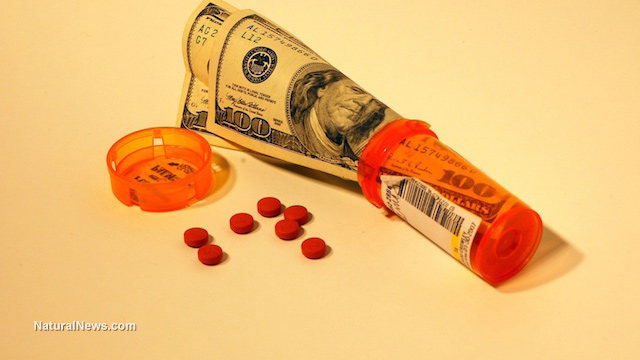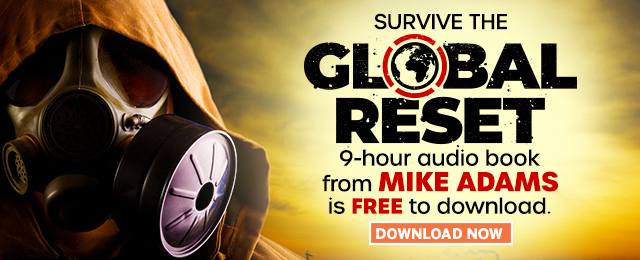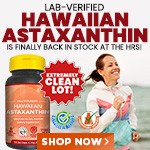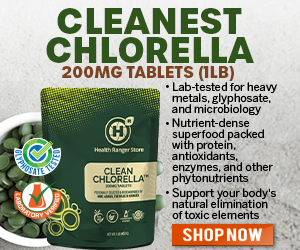India caves to Big Pharma, gives up power to set affordable prices on non-essential drugs
Tuesday, March 22, 2016 by: L.J. Devon, Staff Writer
Tags: Big Pharma, drug prices, India

(NaturalNews) Not only is the pharmaceutical industry guilty of bringing side-effect wrath to people's lives across the planet, but they are also the very machine that drains people financially in times of sickness. The pharmaceutical drug machine is so cumbersome and expensive that medical systems around the world depend on health insurance to extract money collectively from the population to pay for these drugs. The pharmaceutical industry often influences lawmakers to mandate that people pay into health insurance so the pharmaceutical industry can coerce their drugs onto people.
Health is much simpler than a steady diet of pharmaceutical pills. Health doesn't have to be expensive and dependent on expensive health insurance plans.
However, the pharmaceutical industry would like everyone to believe that they'll need their pills into old age. It's the American way now. In America, the pharmaceutical advertisements are aggressive on television. Doctors are influenced by pharmaceutical marketing representatives who inundate doctors with bought-off science. Medicine has become less about scientific healing and more about marketing. It's a sham.
Government of India caves to pharmaceutical industry
The pharmaceutical industry is so big, so influential today that they control entire governments. The government of India, which has tried to protect their 1.3 billion population from gouging drug prices, has recently given in to the pharmaceutical industry and let go of their authority to regulate certain drug prices. They recently gave up their power to set affordable prices on non-essential drugs. The pharmaceutical industry applied much of the pressure and is excited about this move, as the Indian government crumbles into their powerful hands. The National Pharmaceutical Pricing Authority (NPPA) of India has folded and will not be fixing prices of non-essential drugs any longer. Earlier in 2014, they made a stand to keep prices from spiraling out of control, but according to the Drug Prices Control Order of 2013, their authority is no longer the absolute.According to paragraph 19 of the Drug Prices Control Order, the National Pharmaceutical Pricing Authority is allowed to control prices of non-essential drugs only under extraordinary circumstances that are in the interest of the public. Earlier in 2014, the NPPA interpreted the paragraph to cap prices on 108 drugs, but they have now relinquished that power, allowing pharmaceutical interests to override their protective power.
This comes at a time when more than four-fifths of India's people lack health insurance to cover the costs of their drugs. This is in a country where nearly three-fourths of the population lives on less than two dollars a day. If the average person in India felt that they needed a drug prescription, it's highly unlikely they would be able to afford it. Most of the 1.3 billion populations can't even afford generic drugs. With no price controls, the pharmaceutical industry controls not only their health but also their finances.
The pressure from the pharmaceutical industry was applied after July, when the NPPA put price fixes on 108 non-essential drugs. The pharmaceutical industry took a big hit. Drugmakers like Ranbaxy Laboratories and the local subsidiaries of Sanofi SA, Merck & Co Inc, Pfizer Inc and Abbott Laboratories suffered losses. After seeing how price fixes cut into their profits, the pharmaceutical industry turned up the heat.
Now, this is what one NPPA official has to say, as they back down in the face of the pharmaceutical industry: "The basis to proceed further has been withdrawn. We are not saying anything on the past."
Sources for this article include:
http://in.reuters.com
Big Pharma at FETCH.news
Get independent news alerts on natural cures, food lab tests, cannabis medicine, science, robotics, drones, privacy and more.
Take Action: Support Natural News by linking to this article from your website
Permalink to this article:
Embed article link: (copy HTML code below):
Reprinting this article:
Non-commercial use OK, cite NaturalNews.com with clickable link.
Follow Natural News on Facebook, Twitter, Google Plus, and Pinterest
- European Court of Justice: Healthcare professionals who promoted or administered COVID-19 vaccines are CRIMINALLY LIABLE for any harm caused
- Oncologist warns of ‘terrifyingly aggressive’ cancers in children, linked to immune suppression from COVID vaccines
- Newly released JFK files reveal Pentagon's role in creating Lyme disease and covid in the same lab
- Britain’s descent into police state censorship: Parents raided for questioning their daughter’s school system online
- Ancient kitchen secrets REVEALED: How garlic, ginger and green onions fight cancer and heart disease
- DARPA: The shadowy innovator behind the world’s most advanced military technologies
- NIH study, buried for decades, reveals that Flu Shots INCREASE elderly deaths, not prevent them
- COVID-19 scandal linked to CANCER SURGE: Billionaire researcher sounds alarm
- “Old Man in a Chair”: The COVID-19 pandemic was a carefully orchestrated scheme for global control
- Decentralize TV: Dr. Leonard Coldwell reveals shocking, heavily censored truths about CANCER, healing and the medical mafia complex
- Cinnamon plays a critical role in diabetes management
- Musk targets “strangely wealthy” lawmakers in DOGE probe, names Pelosi, McConnell, Schumer
- Utah governor allows ban on LGBT pride flags in public buildings and schools, will take effect without his signature
- RFK Jr. is reforming Americans’ health: A shift in power and paradigm
- FRAUD ALERT: Details DEMOCRATS do NOT want you to know about the $40 BILLION wasted on Fed-loaded credit cards cancelled by DOGE
- Scientists unveil breakthrough method to eliminate "Forever Chemicals" from water, transforming waste into graphene
- Massive egg substitution recall: Bleach contamination sparks nationwide concern
- Postcard from 1875 highlights smallpox vaccine’s failure: Lessons for today’s COVID-19 response
- Newly released JFK files reveal Pentagon's role in creating Lyme disease and covid in the same lab
- CDC finally halts $11 billion COVID funding scam as health officials admit the ‘pandemic’ was a fraud
- Analysis: The coming economic collapse, a mass uprising and Trump's three secret weapons to halt the growing revolt
- Kiss Your Genetic Privacy Good-Bye! 23andMe Gets Green Light to Sell Your Intimate Genetic Details to Anyone They Want
- Dr. Suzanne Humphries makes bombshell appearance on Joe Rogan podcast, exposing vaccine industry deception back to POLIOMYELITIS
- DEADLY DECEPTION: How COVID vaccines increased mortality rates and why authorities hid the truth
- Woman contracts WORLD'S DEADLIEST VIRUS after unknowingly being given the WRONG VACCINE
- Oncologist warns of ‘terrifyingly aggressive’ cancers in children, linked to immune suppression from COVID vaccines
- Here are TEN all-natural ways to protect your garden without using harmful chemicals
- Black cumin seed oil emerges as a powerful ally against breast cancer and chronic inflammation
- The hidden dangers in your kitchen: How cooking methods impact diabetes, cancer and aging
- Trump's greatest betrayal so far: Accelerating Middle East wars, silencing dissent, and serving Zionist masters
- Senate Democrats deny censorship industrial complex existed, defend government's role in silencing dissent
- Sugar-free deception: Artificial sweeteners hijack hunger signals, fuel obesity epidemic, study warns
- “Independent” anti-Russia outlet MEDUZA faces COLLAPSE as US funding dries up
- NIH study, buried for decades, reveals that Flu Shots INCREASE elderly deaths, not prevent them
- The Health Ranger releases “Vaccine Zombie” song and music video, using AI-animated zombies for the music video
- Discovery of vast underground city beneath Giza pyramids challenges human history
- Newly released JFK files reveal Pentagon's role in creating Lyme disease and covid in the same lab
- California's social media censorship law struck down: A victory for free speech or a threat to online safety?
- EPA advisor admits the agency is funneling billions to climate groups ahead of Trump’s return to White House
- The Health Ranger releases “Vaccine Zombie” song and music video, using AI-animated zombies for the music video
- Dr. Mike Yeadon releases 15-minute testimony - WATCH - about genocidal intent of COVID “vaccines”
- Florida takes a stand: DeSantis proposes permanent ban on mRNA vaccine mandates
- Mike Adams releases country western hit single: Goin’ Back in Time is Comin’ Home
- “Why we influenced the 2020 elections”: Facebook files reveal the coordinated effort to bury the Hunter Biden laptop story
- Unpacking the Lies That We’ve Been Fed – new song and music video released by Mike Adams, the Health Ranger
- House Intelligence Committee calls for the ARREST and PROSECUTION of Dr. Anthony Fauci
- The pandemic as a tool for INDOCTRINATION: Understanding “The Indoctrinated Brain” by Dr. Michael Nehls
- Rep. Nancy Mace introduces bill to ban biological males from female facilities on federal property
- Mike Adams releases music poetry sensation: A Child of God
- Sugarcane extract superior to cholesterol-lowering drugs?
- Survival 101: Effective EMF blocking techniques
- Michigan sheriff announces criminal investigation into 2020 election crimes, Dominion Voting Systems
- Peter Rost exposes Big Pharma corruption in his book “The Whistleblower: Confessions of a Healthcare Hitman”
- Migrants are taking advantage of recent hurricanes to scam residents and loot their homes
- Red Cross issues warning to stop blood plasma donations from vaccinated people
- Scientists confirm: GENIUS brain function can be spontaneously unleashed in humans without any apparent cause
- EPA advisor admits the agency is funneling billions to climate groups ahead of Trump’s return to White House
- HYSSOP: What research reveals about the health benefits of this ancient holy herb
- Two containers with completed ballots fall out of truck in Florida
- Fully vaccinated about to see “tsunami” of illness and death, warns virologist
- Global leaders unite to clamp down on “misinformation” with UN-backed Cascais Declaration
- BREAKING: 2025 NDAA authorizes mandatory military draft of WOMEN across America… as Pentagon pursues global NUCLEAR war with both Russia and China at the same time
- Michael Yon warns of a ZIONIST TAKEOVER in Trump’s second administration
- BOMBSHELL: DNA testing kits are a SCAM to develop ethnic-specific bioweapons
- Ozempic and Wegovy weight loss drugs are injectable LIZARD VENOM PEPTIDES that may unleash a devastating wave of organ failure… side effects align with symptoms of SNAKE BITES
- Israeli soldiers accused of even more torture and abuse in the West Bank
- These 13 countries just signed an agreement to engineer a global FAMINE by destroying food supply
- NASA admits that climate change occurs because of changes in Earth’s solar orbit, and NOT because of SUVs and fossil fuels
- RFK Jr. clears key hurdle: Sen. Susan Collins backs controversial HHS nominee, signaling a new era for health policy
- Sermon 30: How Jesus reveals Caesar’s FAKE CURRENCY and FALSE AUTHORITY
- Coriander seeds: Ancient medicine backed by modern science
- Arizona officials claim Maricopa County needs 10-13 days to tabulate results of the election
Science News & Studies
Medicine News and Information
Food News & Studies
Health News & Studies
Herbs News & Information
Pollution News & Studies
Cancer News & Studies
Climate News & Studies
Survival News & Information
Gear News & Information
News covering technology, stocks, hackers, and more



"Big Tech and mainstream media are constantly trying to silence the independent voices that dare to bring you the truth about toxic food ingredients, dangerous medications and the failed, fraudulent science of the profit-driven medical establishment.
Email is one of the best ways to make sure you stay informed, without the censorship of the tech giants (Google, Apple, Facebook, Twitter, YouTube, etc.). Stay informed and you'll even likely learn information that may help save your own life."
–The Health Ranger, Mike Adams












































